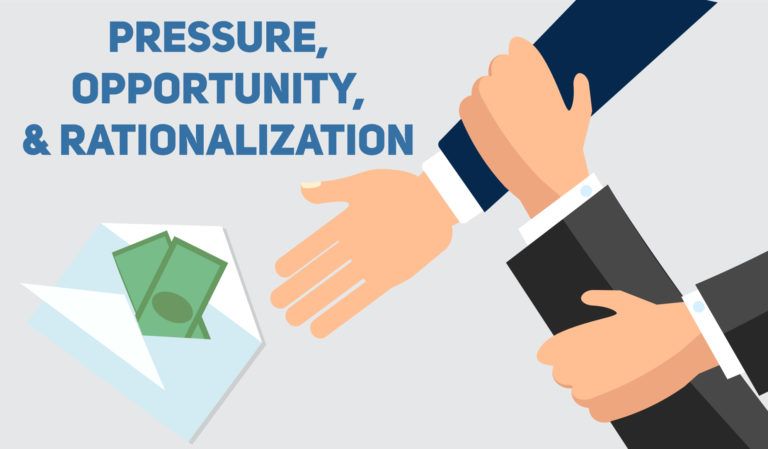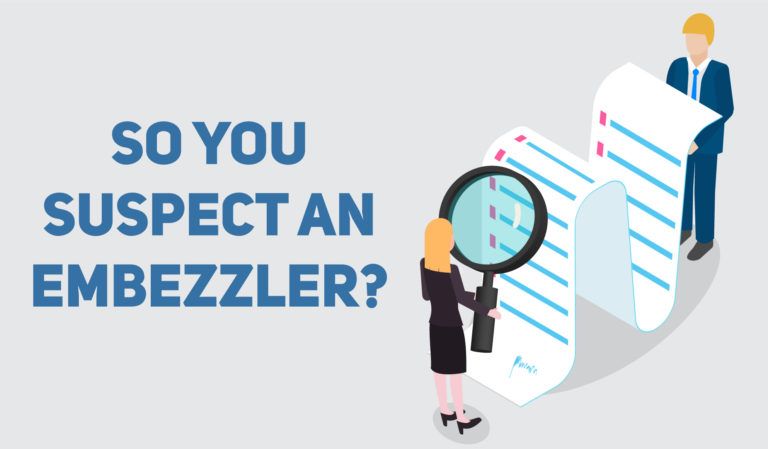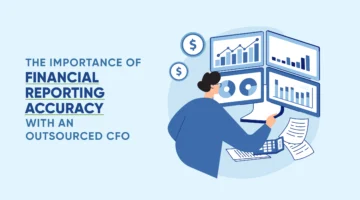Embezzlement: The unspoken nightmare of the business world
No one wants to talk about embezzlement. For every CEO, it’s either the monster under the bed or the scarlet letter on their chest. It’s also extremely common. The U.S. Chamber of Commerce estimates 75% of employees steal from their company at least once.
To make matters worse, rarely do companies get any kind of restitution should they fall victim to embezzlement. Instead, they hesitate to press charges in an effort to avoid embarrassment and brush their losses under the rug. Embezzlement is treated like a black mark on a company’s integrity when it is nothing more than a sad case of trusting the wrong person.
The definition of embezzlement is theft of entrusted items, and it ranges in severity from payroll fraud to hundreds of thousands of dollars skimmed over years of employment. It tends to hit small businesses the hardest, with over 80% of crimes committed at companies of 150 people or less, according to global business insurer Hiscox. It has the potential to devastate an entire business; the U.S. Chamber of Commerce estimates that 30% of businesses fail due to embezzlement. Small businesses have enough obstacles in their path without adding embezzlement. Every business can take steps to prevent theft.
Watch Out for the Fraud Triangle
People steal when they are in the fraud triangle. The fraud triangle means they have pressure, opportunity and rationalization. Pressure can be anything from a recent influx of medicals bills to a sudden decrease in household income. One of our clients caught an embezzler who simply wanted to update their home but didn’t have the budget.
Opportunity presents itself when a single person oversees the company finances or has unsupervised access to company funds. It is not uncommon for small businesses to have an accounting department of one or an office manager who cuts and signs checks with the business owner’s stamp.
Rationalization runs the gamut from seemingly innocent to overtly malicious. A loyal employee might be a little behind one month in their personal life and think no one will notice a few hundred dollars, fully intending to replace the funds when their finances improve. A difficult employee might believe themselves deserving of a raise or bonus only to be told no and decide to take matters into their own hands. Employee mindset might even be as simple as the company is doing well and won’t miss an extra thousand dollars.
The easiest way to avoid embezzlement is to limit the potential for the fraud triangle.
Preventative Steps
Theft is a hard crime to catch because it is often committed by the most trusted individuals — otherwise, they wouldn’t have access in the first place. Limiting the potential for embezzlement begins with acknowledging that it can happen to anyone. Ensure there is a division of job responsibilities. If the accounting department is a party of one, make sure there are still regular reviews with a supervisor, either weekly or monthly. Choose someone with enough financial knowledge that they can understand basic reports without the help of the person who pulled them. This includes a balance sheet, cash flow forecast and year to date. If nothing else, make sure the person who writes the checks is different from the person who signs the checks.
Next, be sure to build financial visibility. This means creating an environment where multiple people know and understand the financial state of the company at any given time. An easy way to do this is bringing in a third-party. Small businesses in niche industries might lack employees with advanced financial understanding and lack the funds to maintain a robust accounting department. In these situations, outsourcing the accounting department to a third party is an economical and responsible choice.
A good third-party company will have built-in supervision — most if not all of whom are financial experts — and their access to your company’s funds will be limited. Companies can give their third-party read-only access. While the outsourced team can see and analyze the company financials, read-only access does not allow them to influence funds in any way. If they can’t write checks or make changes, it is much harder to steal. Take the time to strengthen your accounting department and keep an eye out for any damage already done.
Red Flags
While no one wants to discover an embezzler in their midst, it’s a good idea to keep a few red flags in mind. Embezzlers look like excellent employees on the surface: they rarely take time off, they are very involved in their job and they religiously maintain the company’s financial security.
Ask yourself if you have any employees who never take time off. Do they also work independently, with little or no oversight? Are they cagey about the company’s expenditures, refusing to teach others how to pull reports or access information? Do they take a long time or push back when asked to present company financial information? Is there a good justification for their behavior or are they needlessly secretive? An employee who really likes their job is a great company asset, but a buildup of red flags might be worth investigating.
Worst Case Scenario
The first step to recovering from embezzlement is to investigate the full extent of the loss. This is best done by a third-party accounting company. They won’t have any bias when looking into the company finances, and most outsourced accounting firms have seen embezzling before — often several cases a year. Once the extent of the loss is uncovered, the business owner can take steps to prosecute the criminal and to reinforce the company, preventing further damage. This means establishing a division of labor and creating financial visibility. A third-party can also help manage the finances while you search for a replacement employee.
The Hard Truth
Unfortunately, embezzlement is almost always a crime of money spent — no one steals to pad their savings. For this reason, it can be difficult to recoup the losses and impossible if the company fails to press charges. There is an attitude of embarrassment in the business world which prevents owners from filing against their former employees. However, this allows for serial embezzlers to transition from company to company without ramifications for their actions. The best advice for small businesses is to implement prevention early and hold employees accountable for their actions, whether or not they steal. Embezzlement may be common now, but that doesn’t mean it has to remain so in the future.






